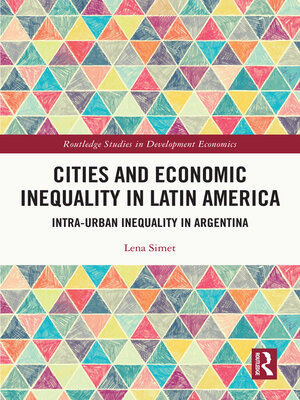Cities and Economic Inequality in Latin America
ebook ∣ Intra-Urban Inequality in Argentina · Routledge Studies in Development Economics
By Lena Simet

Sign up to save your library
With an OverDrive account, you can save your favorite libraries for at-a-glance information about availability. Find out more about OverDrive accounts.
Find this title in Libby, the library reading app by OverDrive.



Search for a digital library with this title
Title found at these libraries:
| Library Name | Distance |
|---|---|
| Loading... |
This book examines trends and determinants of economic inequality in cities in Latin America, the world's most unequal region. It explores how the gap between the haves and the have nots manifests in every part of urban life – from housing to schooling to employment. It asks why some cities have higher inequality than others and what we can learn from these differences as we push back against inequality.
The book starts with reviewing the policies and forces that explain the rise and fall of inequality in Latin America since the 1990s and why progress in reducing inequality has stalled. It then focuses on Argentina's cities and applies a set of quantitative tools to identify inequality determinants. It finds that intra-urban inequality generally mirrors national-level trends, but local idiosyncrasies related to a city's labor market, informal employment, and social protection systems matter. The book discusses the pitfalls of privatizing public services that turned access to water in metropolitan Buenos Aires more unequal. It explores the promises and unintended consequences of slum upgrading initiatives in Buenos Aires' Villa 20.
The book presents lessons that can inform policies and practices in the region and beyond. Developing a strategy against inequality that incorporates local features and resists the temptation to rely on the "free market" for solutions to urban problems offers a powerful opportunity. Drawing from the field of economics and social and urban policy, this book shows that the battle against inequality is not only won and lost in cities but also requires a uniquely public and urban response. As such, it will be of interest to advanced students, researchers, and policymakers across development economics, urban studies, and Latin American studies.







